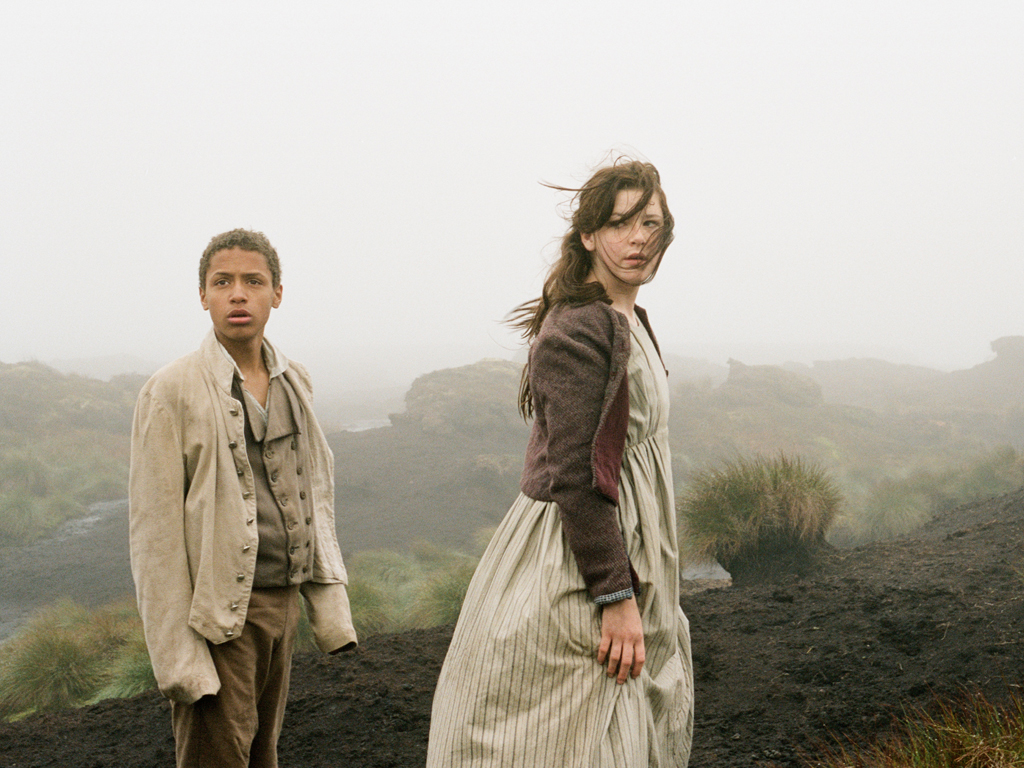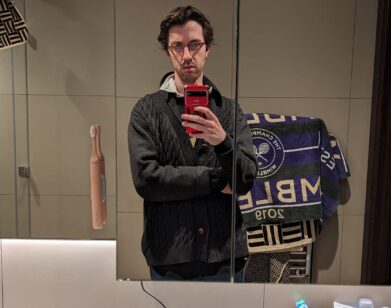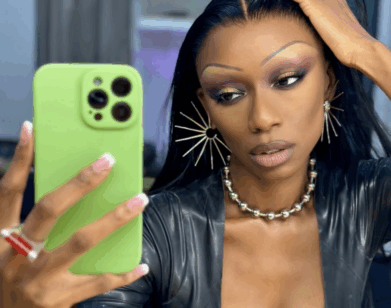Andrea Arnold in Brontë Country

ABOVE: SOLOMON GLAVE AND SHANNON BEER IN ANDREA ARNOLD’S WUTHERING HEIGHTS.
Following the deaths of her sisters Emily and Anne, Charlotte Brontë dutifully penned her now famous preface, “Biographical Notice of Ellis and Acton Bell,” published in an 1850 reprint of Wuthering Heights. In it, she disclosed the mysterious identity of the writers Currer, Ellis, and Acton Bell: pseudonyms the sisters, awake to the reality “that author-esses are liable to be looked on with prejudice,” had chosen. Moreover, her note was a tribute to Emily. Her sole novel suggested a deep and jangling, wanton melancholy. By no means was it “feminine.” As Charlotte remarks about her younger sister, “An interpreter ought always to have stood between her and the world.” Perhaps, no matter how garbled, the many adaptations (and interpretations) of Wuthering Heights—for film, television, radio, the ballet, the opera—are a testament to Emily’s proximity to artists’ tempestuous pathos.
Andrea Arnold, the British director who won an Academy Award for her 2005 short, Wasp, might at first glance seem like an unlikely purveyor of a Wuthering adaptation. Her two features are bleak contemporary portraits of women on the verge—disquiet brought on by obsessive retribution in Red Road and choleric teenage torment in Fish Tank. Both, however, wield a tenderness that is at its core human. In this way, Arnold’s take on Brontë’s sole novel is imaginatively faithful.
Shot by her longtime cinematographer, Robbie Ryan, Arnold’s Wuthering Heights looks delusively real. Nature imposes. The Yorkshire moors are muddy and moody. Animals and insects occupy the screen for extended minutes, their anatomy transfixing. Young Heathcliff and young Cathy (played by newcomers Solomon Glave and Shannon Beer) speak a private, physical language that is raw and rises within them as if inherited. Skins actor Kaya Scodelario, who plays Older Cathy, has the indelicate, dewy stare, like so many of Arnold’s past characters, of a women whose mind is stuck elsewhere—somewhere stormy and unresolved.
Interview spoke to Arnold about her aversion to adaptations, her attraction to revenge narratives, and Wuthering Heights as a feminist novel.
DURGA CHEW-BOSE: At the BAM screening of Fish Tank a few years ago, during the Q&A with Michael Fassbender, someone asked you about your writing process. You answered that an image first came to you, specifically that of Mia (Katie Jarvis) peeing on the living-room carpet of Connor (Fassbender)’s suburban home. From there, the entire movie emerged in your mind.
ANDREA ARNOLD: Right, yeah.
CHEW-BOSE: Was there an image, while adapting Wuthering Heights, that too provoked you?
ARNOLD: There was. I had one image that I always went to whenever I got lost and bogged down in practical details, so I had this one image that kept reminding me of why I started with this journey. My image for Wuthering came to me quite early on, actually. I had this idea in my head of this big wide shot of the moor and the sky, and it’s that twilight time when the sky melts into the land. And there was a large animal climbing the face of the moor, but when you went in closer you could see that it wasn’t an animal, but it was Heathcliff with lots of rabbits on his back. From a distance he looked like a huge animal, but when you got closer you saw that it was a man. So that was my image, and it wasn’t in the film because when we came do that image, we had about 10 minutes, and it was bright blue sky and we didn’t have a enough rabbits, and we simply didn’t have the time. But it was my guiding image.
CHEW-BOSE: The spirit of that image, of animal as man and vice versa does though, thrust the entire film.
ARNOLD: Yes, it is. I was sad I couldn’t achieve that—it was the first time I hadn’t achieved the actual image that guided me.
CHEW-BOSE: In that same Q&A, you spoke about working with Jarvis, who had never acted before, whom you actually cast after spotting her on a train platform fighting with her boyfriend. In Wuthering, too, some of the actors are young and inexperienced, but just like Jarvis, they give colossal and profound performances. What draws you to non-actors?
ARNOLD: I’m always looking for authentic people for the roles. With Fish Tank, it was important to find someone who actually came from that world. In this film, I wanted the Heights to feel quite raw and unwieldy, and I think that choosing people that had never acted before would give it that quality. They’re acting, but they’re not acting, and the qualities that they have are quite genuine qualities.
CHEW-BOSE: Revenge is a theme you return to…
ARNOLD: Yeah, I don’t know where that comes from. I don’t know why I keep returning to that. I don’t feel very revengeful in life at all. So that’s interesting. It’s weird.
CHEW-BOSE: Well it makes for a good story. It’s as if Red Road, Fish Tank, and now, Wuthering, make for a great Revenge Trilogy.
ARNOLD: Right, right. It does come up a lot, and I do believe it comes up for a reason. It’s something I need to think about, maybe.
CHEW-BOSE: What were some of the conversations you and Robbie Ryan, who you’ve worked with for years, had about creating Wuthering‘s look? Despite how wild and stormy the story is, its gloom verges on magical—the immediacy of nature, all those shades of greens, the mud, the mist. It was involving. The screen seemed somehow moist.
ARNOLD: [laughs] Yes, I guess it does seem moist! We talk less and less as we go along, Robbie and I. I use the word “visceral” a lot with all the descriptions of how I wanted it to feel, with the designer, with Robbie, with everybody working on it. In fact I think I wrote a list of words that I wanted the film to have the feel of. And I gave that list to a bunch of people. I should have kept that list, shouldn’t I? We also looked at photographs, we did tests using different film stock. I always wanted it to be, exactly like you were saying, you could feel it.
CHEW-BOSE: And you can hear it all, too.
ARNOLD: Yeah, that was important, too. I didn’t want there to be artificial sound. I wanted everything to feel very real. And I say real, but I also take that back. Magical, like you said. They’re beautiful. I sometimes go the Natural History Museum and look at all the insects. I’ve often thought that if I didn’t do this job, I’d like be one of those people who goes and discovers insects in the rainforest. I love insects. They are amazing. Those moths are among one of my favorite things in the film and I swear, I could have just left the camera on those moths for two hours and I would have been quite happy.
CHEW-BOSE: Do you relate to when Cathy says that she is Heathcliff?
ARNOLD: Yeah probably. I think that’s what the film’s about, on some level. Aren’t we all, kind of? There probably is, but it’s not a place I like talking about. [laughs] We’re all quite vulnerable human beings really.
CHEW-BOSE: Most of the time, adaptations from novels to film do not work. How do you approach that challenge?
ARNOLD: Interestingly, I never thought I’d do an adaptation. I’ve also been quite against them. I think trying to translate one medium to another is wrong. I never really felt that books fitted into film. Generally people are disappointed, aren’t they? People read a book and invest themselves in it. To then see a concrete version of someone else’s imagination is nearly always disappointing. And so I think it’s a mad thing to do. But it was beyond me. Once I decided to do it, I couldn’t let it go. I went on this journey, and even when the journey was fraught, I couldn’t leave it alone. I don’t know, but I think it was because of Heathcliff. I wanted to stick with him. I wanted to tell his story. I do think it was a mad thing for me to do on some level. But it was liberating, because it’s not like something I should have probably done, but I couldn’t help it, and I did it.
CHEW-BOSE: And now, you feel…
ARNOLD: Liberated from expectations. On some level, people are surprised and intrigued by why I did it, so therefore, in some ways it means you can be unpredictable, and it doesn’t matter.
CHEW-BOSE: Yes and no, because while watching it, it was clear to me that this was an Andrea Arnold film. It was very near to your shorts, in how explosive and impressionistic certain moments are.
ARNOLD: That’s what people have said as well. But I do think it was maybe the maddest thing I could have done.
CHEW-BOSE: Female protagonists, their perspectives are who and what you’ve made movies about in the past. And now Heathcliff. Was that a clear transition for you? Or was it not something you even considered?
ARNOLD: Well, you know, weirdly I think he’s not such a male lead. I think he’s quite androgynous. I think he’s really Emily. I’ve realized that lots of men don’t like the book, and I keep thinking why they don’t they like the book. I think it’s a really feminine book—that it’s quite a feminist book. Heathcliff is really quite female. So I feel like I did do the woman’s point of view in a roundabout way. He is Emily. He’s a part of Emily. He is the darker, wilder side of Emily. Perhaps, on some level, a true side of herself that she hid. We all have sides that we don’t reveal to the world. And with Emily, perhaps he is that side of her that was inhibited from being female at that time. You had to be quiet. You were not allowed to express. He was a part of her anger. So perhaps, without even noticing it, it wasn’t entirely a departure for me.
WUTHERING HEIGHTS IS OUT IN LIMITED RELEASE TODAY.






